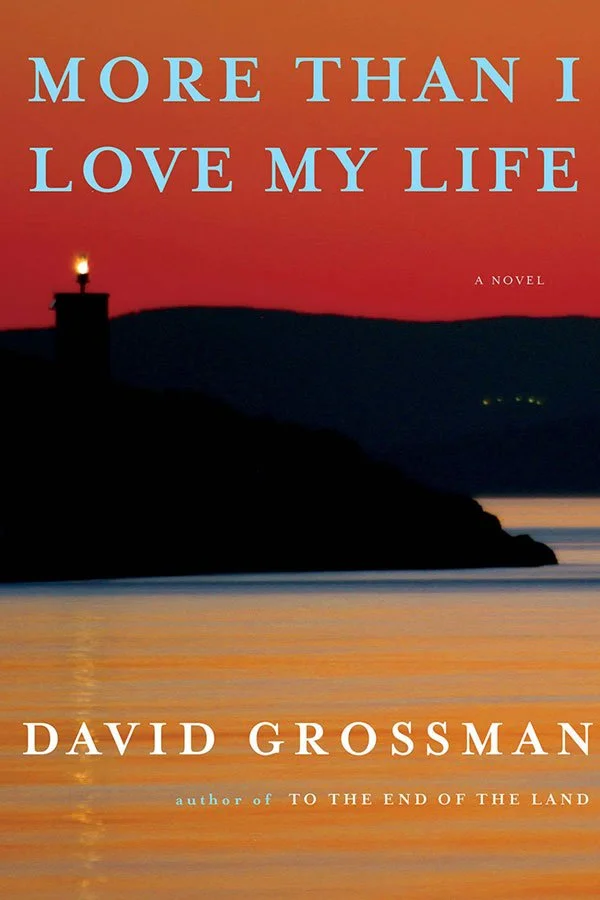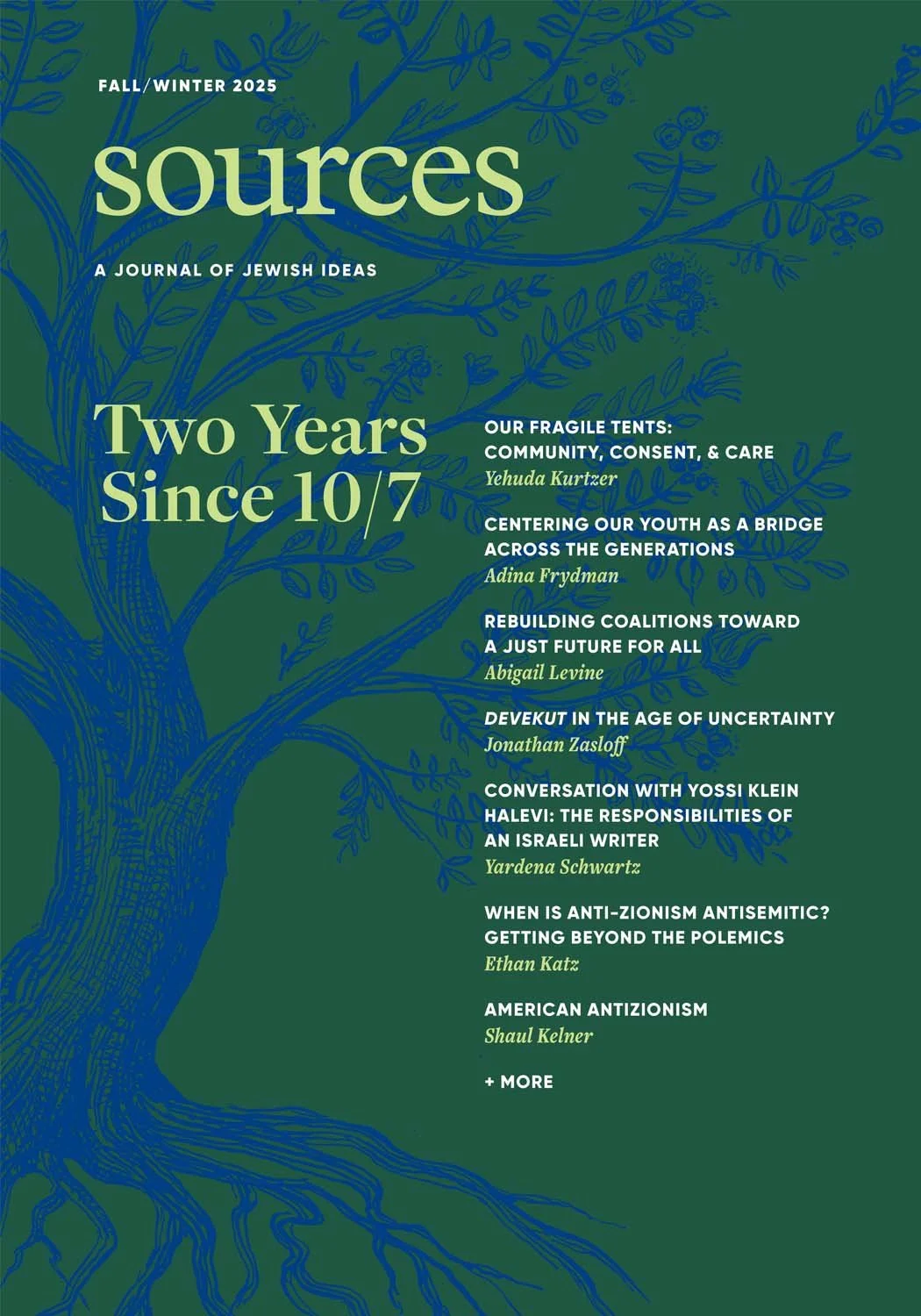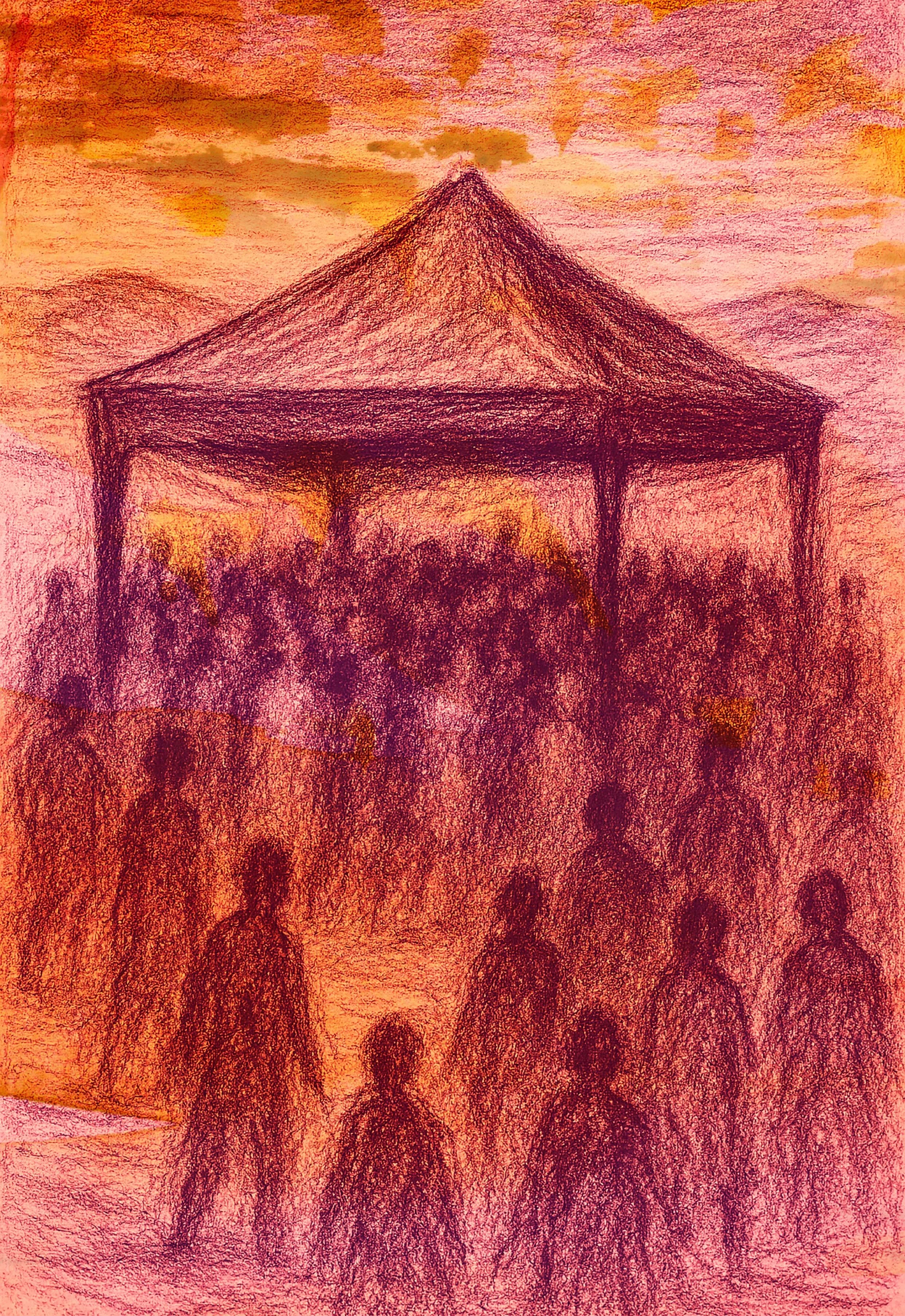Children of the Heart
Dara Horn
Dara Horn is the author of five novels, and most recently the essay collection People Love Dead Jews (W.W. Norton, 2021).
BOOKS
More Than I Love My Life
By David Grossman
Translated by Jessica Cohen
Knopf, 288 pages, $27.00
The Israeli novelist David Grossman was my favorite author until I tried to teach one of his books. In subjecting a novel I loved to the bright light of a seminar room, where beauty and inventiveness must yield to critical judgment, I was shaken by what I’d discovered. That was nearly twenty years ago, and I’ve been trying to recover my love for Grossman’s writing ever since. His newest novel, More Than I Love My Life, has at last rekindled that love.
When I was a teenager, my favorite book in the world was Grossman’s 1986 novel See Under: Love. The book begins from the point of view of an Israeli boy in the 1950s whose neighborhood is populated by Holocaust survivors, including his parents, who never speak of what they endured. To decode the secret into which he was born, the boy becomes a detective; with innocent if somewhat cloying charm, he keeps spy notebooks and assembles dictionaries of things he overhears. When the boy becomes an adult writer, he continues his childhood work of trying to fathom the Holocaust by means of extraordinary feats of language and (often surreal) imagination.
In one long section, Grossman’s narrator imagines an incident involving one of his demented survivor relatives, a popular European children’s writer named Wasserman. At Auschwitz, we are told, Wasserman fails to die in a gas chamber (surrealism alert), and is brought before an SS officer named Neigl, who turns out to be a childhood fan of Wasserman’s books. Neigl forces Wasserman to compose a new story about his beloved characters, a group of multicultural heroes called the “Children of the Heart” who travel through time and space to rescue victims of oppression. Wasserman uses the opportunity to engage with Neigl’s humanity and to confront the Nazi with his choices.
The vanity of this conceit (a writer can unlock anyone’s heart!) was apparent to me even as a teenager. I was nonetheless swept along by Grossman’s hypnotic storytelling and his faith in the power of language. The author clearly expected his readers to share that faith. Grossman assumes that Neigl is motivated not by sadism but by conformity, a gradual sinking into a moral pit. Evil, in this vision, emanates from apathy.
Love Jewish Ideas?
Subscribe to the print edition of Sources today.
But Neigl is neither a bystander nor lowly guard. He is the commandant of an extermination camp. Just as Yiddish-speaking survivors of Nazi barbarity rejected Hannah Arendt’s famous assessment of Eichmann as a banal bureaucrat, I as a Yiddish reader saw something amiss in Grossman’s portrait. Grossman pries open Neigl’s heart and finds a person just like you and me, rather than someone like the SS officer that the Yiddish poet Avrom Sutzkever described running the liquidation of the Vilna ghetto: a sadist who set up a grand piano at the city’s deportation point and theatrically played it with one hand while shooting children with the other. As a student of Yiddish literature, I came to see as inadequate any exploration of “evil” that didn’t include the sheer delight of genuine sadism. I found the failure of See Under: Love to do so devastating.
“H.N. Bialek and David Grossman both mined the Jewish literary past for imaginative ways to address contemporary trauma.”
My students, too, saw the problem. Having read “Revealment and Concealment in Language,” the famous essay by Hebrew poet Hayim Nachman Bialik, they were primed to notice the novel’s almost maniacal faith in the power of language. Bialik described the ways we use language to conceal the void at the heart of history. A writer, Bialik said, is one who “crosses a river… while stepping across floating, moving blocks of ice…. Between the breaches the void looms.”
While their writing couldn’t be more different, Bialik and Grossman both mined the Jewish literary past for imaginative ways to address contemporary trauma. In Bialik’s case, the otherwise lyrical writer used a fiery poetics in response to Russian pogroms by borrowing the voices of Hebrew biblical prophets to rage against what he saw as the Jews’ passivity in the face of sadistic violence. In See Under: Love, Grossman borrows two voices from the literary past to push in the opposite direction, toward a more passive (or at least less angry) response to even greater atrocities.
The first voice belongs to Yiddish writer Sholem Aleichem, and particularly to Motl the Cantor’s Son, about a Jewish child who only vaguely understands the pressures that send his family on what he perceives as an adventure in their flight from Russia to America. The child’s innocent view of his family’s traumas turns the anguish of dislocation into a kind of harmless comedy. The second borrowed voice is that of Polish-Jewish writer Bruno Schulz, who similarly favored a child’s view of the world in his astonishing lyrical works about daily life in prewar Poland—works that studiously avoid moral judgment or sense of agency in favor of exuberant imagination and wide-eyed wonder.
In subsequent decades, Grossman’s fiction has often focused on the lives of Israelis caught in endless military conflict. In his nonfiction and activism, he has been an outspoken advocate for peace and for the rights of Palestinians. In August 2006, while Grossman was writing To the End of the Land, his monumental novel about a parent fearing for her soldier son’s survival, his 20-year-old son Uri was killed in southern Lebanon. The tragedy gave Grossman’s profoundly humanistic voice an even greater urgency and lent him an almost holy aura as a bereaved parent. In recent years he has been a vocal presence at rallies supporting Palestinian residents facing eviction from the East Jerusalem neighborhood of Sheikh Jarrah.
Through it all, one hears that childlike voice that maintains that faith in humanity. But the older I become, the more troubled I am by that voice’s idealization of innocence, which seems inimical to adult wisdom. As a reader and a writer, I so badly want books to make me a better person, to help heal rifts in the human heart. But I cannot square that desire with the abandonment of moral judgment that approach seems to demand.
More than I Love My Life, like See Under: Love, tells an intergenerational story of uncovering a traumatic past—in this case, an Israeli woman documenting her grandmother’s experience in a Yugoslavian gulag. The new novel, which is far better served by Jessica Cohen’s direct and fluid translation than See Under: Love was by its translator, is Grossman’s imaginative retelling of the life story of Eva Panić Nahir (1918-2015). Nahir was a World War Two partisan from the former Yugoslavia who endured brutal imprisonment and torture in the gulags of the dictator Tito before emigrating to Israel. Grossman wrote it with the blessings of Nahir (with whom he enjoyed a twenty-year friendship) and her daughter. He says the two women granted him total imaginative freedom.
Nahir has charmed more than a few writers. She has already been the subject of multiple biographies, an Israeli documentary, and a Serbian television series helmed by the renowned Serbian novelist Danilo Kiš. Nahir apparently convinced Grossman, a towering literary giant who can write about anything he chooses, to devote years of his life and several hundred pages to her story, which has been amply told before.
I don’t buy it. I don’t mean that I don’t buy that this novel is inspired by Nahir’s life. I mean I don’t buy the notion that Grossman wrote this book because this woman charmed him into it. Why her, and why now? While Nahir’s survival story may strike English-language readers as exotic, she is, sadly, hardly unusual among her generation of Israelis. As an account of a granddaughter trying to decode her grandmother’s traumatic past, the new novel has none of the imaginative energy of See Under: Love. But something else is going on here beyond the grim story of what happened to Grandma in some exotic totalitarian state, and that’s where the novel takes on a new and more profound meaning.
“Grossman’s usual narrative nostalgia for an innocent past is utterly absent here.”
If More Than I Love My Life represents a departure for Grossman, it is not because the story largely takes place outside of Israel but because it turns away from innocent “Children of the Heart.” Its narrator Gili, a woman in her late 30s, was abandoned by her flighty mother Nina, and yet is mature enough to see beyond that abandonment. Gili grows up in the shadow of her larger-than-life grandmother Vera, in the “buzzing family hive where Vera reigned supreme,” a family that “tightened around Vera…like a body protecting its own vulnerable organ.” Vera, a charismatic and domineering old kibbutznik, was a World War II partisan fighter in Yugoslavia, where she was maniacally devoted to her husband Milosz, who shared her Communist idealism. As Vera celebrates her ninetieth birthday in Israel, Gili and her father Rafi decide to travel with Vera and Nina to Goli Otok, the barren Adriatic island where Vera had been imprisoned, to make a documentary about Vera’s life.
Vera’s rambling voice, riddled with charming errors and the stagey assumption that everyone is always listening to her, seems at first like the voice of a wise old woman. When Vera’s disturbed (and now ailing) daughter Nina returns to Israel, Gili and the family close ranks around Vera as Gili fixates on how Nina abandoned her. Grossman’s usual narrative nostalgia for an innocent past is utterly absent here. From the beginning, Gili is bitter and angry—but refreshingly in Grossman’s oeuvre, she’s not wrong to be angry. She has simply been angry at the wrong person.
Here the novel cracks open, leading toward its central revelation. In Vera’s Israeli family, her resilience in Tito’s gulag is the foundational legend demonstrating her indomitable courage and devotion to her dead husband. As Gili and her father make their film, however, it becomes evident that Vera’s devotion to her dead husband was a calculated choice—at six-year-old Nina’s expense. When her husband was captured by Tito’s secret police and killed himself in prison, authorities offered Vera a choice: denounce her dead husband as a Stalinist traitor and return home to her daughter, or go to the gulag and leave her parentless six-year-old daughter to be “thrown on the street.” Vera/ Nahir chose not to denounce her dead husband, whom she loved “more than I love my life,” and, as she says in both the novel and the documentary, more than she loved her living six-year-old daughter.
Grossman pries open not the agony of the gulag but the scarring trauma of Vera’s devotion to ideology in the guise of love. Vera’s granddaughter Gili has been raised to idolize Vera as the devoted one who cares for those left behind, and to demonize her mother Nina as “spoiled, and weak, and a princess” who selfishly abandoned her daughter Gili. Discovering the truth turns Vera from a hero to a villain in Gili’s eyes: “How could I have been seduced like that? What an idiot I was, to let her program me with her version.”
Grossman’s poetic descriptions of the torture Vera endured seem intended to evoke a kind of Natan Sharansky-like courage in the face of absolute evil. Yet he excludes from this novel any discussion of the ideology to which Vera (and the real-life Nahir) was devoted. Her Communist beliefs figure, if at all, only in connection to her later embrace of leftist Israeli causes. Fair enough; nobody wants to read a novel about infighting in the Comintern. But the omission leaves a gaping hole.
In reality, Nahir and her beloved husband were not merely idealists but Tito loyalists, rewarded with leadership roles in Tito’s repressive regime—the excesses of which they unquestioningly accepted until they themselves fell victim to one of the bottomless purges to which such an ideology must inevitably lead. Nahir and her beloved husband were complicit in that evil. In the documentary about her life, Nahir admits that she and her husband were naïve about Tito. In Grossman’s novel, Vera makes no such admission about her own fallibility. Instead, she repeatedly insists that she loved her dead husband “more than I love my life.” After one such proclamation, Gili exclaims: “I can’t take it anymore.” And that’s when I finally felt my love for Grossman return.
On their trip to the island, both Nina and Gili find revelation—not in Grossman’s trademark wide-eyed wonder but in an adult wisdom that yields “huge relief. Clarity.” That relief renders innocence impossible, and that clarity is moral in nature. That clarity was what I missed for so long in Grossman’s fiction. More Than I Love My Life is not by any measure Grossman’s finest work. But in acknowledging the limits of language—and therein the limits of empathy—it illuminates Bialik’s void with the light of true clarity.
This article appears in Sources, Spring 2022.




